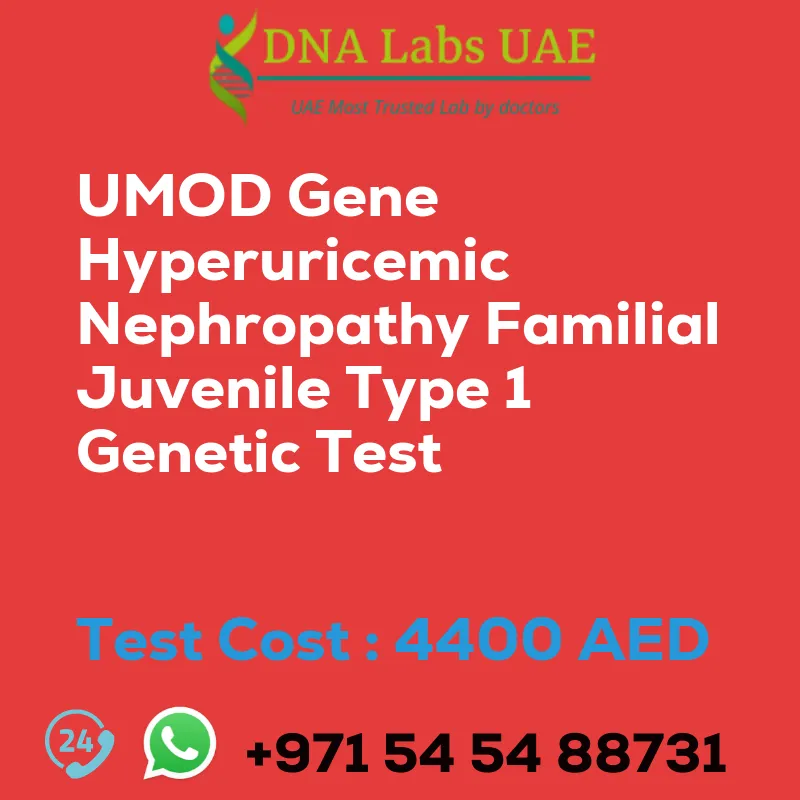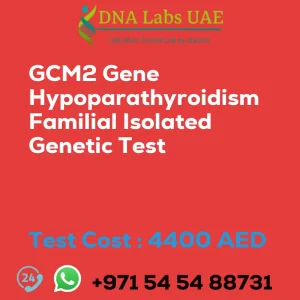UMOD Gene Hyperuricemic Nephropathy Familial Juvenile Type 1 Genetic Test
Test Details
UMOD gene hyperuricemic nephropathy, familial juvenile type 1 is a genetic disorder characterized by the accumulation of uric acid in the kidneys, leading to kidney damage and impaired kidney function. It is an autosomal dominant disorder, meaning that a mutation in one copy of the UMOD gene is sufficient to cause the condition.
NGS (Next-Generation Sequencing) genetic testing is a type of genetic testing that uses advanced sequencing technologies to analyze multiple genes simultaneously. In the case of UMOD gene hyperuricemic nephropathy, familial juvenile type 1, NGS genetic testing can identify mutations or variations in the UMOD gene that are associated with the condition.
NGS genetic testing can help diagnose individuals with suspected UMOD gene hyperuricemic nephropathy, familial juvenile type 1 and can also be used for carrier testing in individuals with a family history of the disorder. It can provide valuable information for healthcare providers to develop appropriate treatment plans and provide genetic counseling to affected individuals and their families.
It is important to note that genetic testing should be performed and interpreted by qualified healthcare professionals, such as geneticists or genetic counselors, who can provide appropriate guidance and support based on the test results.
Test Name: UMOD Gene Hyperuricemic Nephropathy Familial Juvenile Type 1 Genetic Test
Components:
- Price: 4400.0 AED
- Sample Condition: Blood or Extracted DNA or One drop Blood on FTA Card
- Report Delivery: 3 to 4 Weeks
- Method: NGS Technology
- Test Type: Hepatology Nephrology Endocrinology Disorders
- Doctor: General Physician
- Test Department: Genetics
Pre Test Information
Clinical History of Patient who is going for UMOD Gene Hyperuricemic Nephropathy Familial Juvenile Type 1 NGS Genetic DNA Test. A Genetic Counselling session to draw a pedigree chart of family members affected with UMOD Gene Hyperuricemic Nephropathy Familial Juvenile Type 1 NGS Genetic DNA Test gene UMOD.
| Test Name | UMOD Gene Hyperuricemic nephropathy familial juvenile type 1 Genetic Test |
|---|---|
| Components | |
| Price | 4400.0 AED |
| Sample Condition | Blood or Extracted DNA or One drop Blood on FTA Card |
| Report Delivery | 3 to 4 Weeks |
| Method | NGS Technology |
| Test type | Hepatology Nephrology Endocrinology Disorders |
| Doctor | General Physician |
| Test Department: | Genetics |
| Pre Test Information | Clinical History of Patient who is going for UMOD Gene Hyperuricemic nephropathy, familial juvenile type 1 NGS Genetic DNA Test. A Genetic Counselling session to draw a pedigree chart of family members affected with UMOD Gene Hyperuricemic nephropathy, familial juvenile type 1 NGS Genetic DNA Test gene UMOD |
| Test Details |
UMOD gene hyperuricemic nephropathy, familial juvenile type 1 is a genetic disorder characterized by the accumulation of uric acid in the kidneys, leading to kidney damage and impaired kidney function. It is an autosomal dominant disorder, meaning that a mutation in one copy of the UMOD gene is sufficient to cause the condition. NGS (Next-Generation Sequencing) genetic testing is a type of genetic testing that uses advanced sequencing technologies to analyze multiple genes simultaneously. In the case of UMOD gene hyperuricemic nephropathy, familial juvenile type 1, NGS genetic testing can identify mutations or variations in the UMOD gene that are associated with the condition. NGS genetic testing can help diagnose individuals with suspected UMOD gene hyperuricemic nephropathy, familial juvenile type 1 and can also be used for carrier testing in individuals with a family history of the disorder. It can provide valuable information for healthcare providers to develop appropriate treatment plans and provide genetic counseling to affected individuals and their families. It is important to note that genetic testing should be performed and interpreted by qualified healthcare professionals, such as geneticists or genetic counselors, who can provide appropriate guidance and support based on the test results. |








